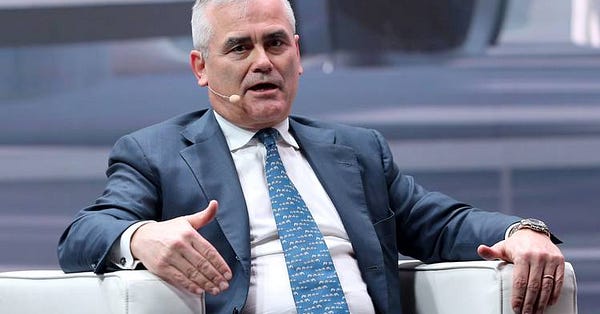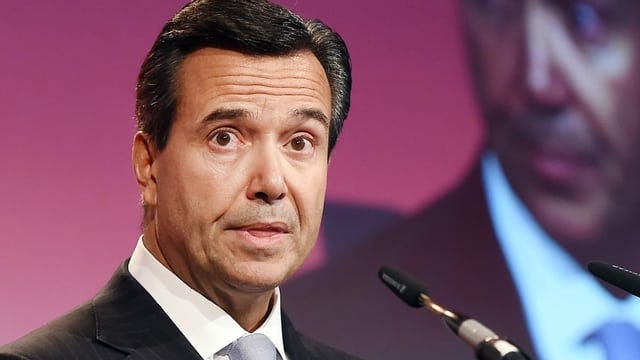Dear Insider,
This Easter weekend 🌷 we return with a new edition of The Swiss Insider.
Are you ready?!
There can be only one topic of conversation in Swiss business this week…and no, it’s not the pandemic.
Credit Suisse, that venerable creation of Swiss pioneer Alfred Escher, has found itself in deep ____. (You fill in the blank…)
After last year’s drama involving private detectives, spying and a departed senior management star, this year brings major misjudgment in loans to Greensill Capital, risky investment banking bets (to the tune of USD 30 billion in forced liquidations after failed margin calls) with shady family office Archegos and continued questions about a share price that has now dipped below CHF 10 and whispers of incompetence on the part of chairman Urs Rohner.
Is it a ticking time bomb? Not if you ask Finance Minister Ueli Maurer… (See The Scoop below). 😏
What is driving the demise of Credit Suisse? Surely, the bank isn’t run by a bunch of idiots…surely…?
The more nuanced answer is that a combination of high stakes, competition and shrinking margins has put general pressure on banks to “shoot for the moon” when it comes to big deals.
Combine this with Swiss reticence for admitting defeat and learning from mistakes and you get a powerful potion of problems.
This Easter won’t be joyful on Paradeplatz. There are cracks in the golden eggs which have so long been laid there. 🥚
Who knows how rotten they will turn out to be…
By the Numbers
Numbers that matter…
CHF 30 billion
It turned out to be a record year for Migros in 2020. With CHF 30 billion in revenue (and CHF 1.76 billion in profit), the largest retailer saw its fortunes rise. It was the only thing going up. Sales of organic foodstuffs - highly valued during a health crisis - jumped by over 15% to CHF 1.2 billion. Online sales also shot up and made up a full 10% of the firm’s overall revenue.
25%
Small businesses are feeling the pinch as lockdowns drag on and vaccine rollouts move slowly. A recent survey showed that 1 in 5 SME has been forced to lay off staff. The Swiss unemployment department (RAV) is overloaded.
40
With turbulent markets come M&A opportunities. Coop, the second largest retailer in Switzerland, has announced that it will take over 40 locations from DIY chain Jumbo. This comes in addition to the 73 locations under its own brand.
Feeling smarter (already)? 😀
Share this episode!
The Briefing
Burning news from around Switzerland - bit by bit…
Trickle-down effect
Joe Biden is going big. And his coronavirus relief package isn’t the only big gun in his war chest. The American president this week revealed an ambitious infrastructure plan worth a total of more than USD 2 trillion. Swiss businesses are also rubbing their hands in delight.
According to a survey of the CFA Society Switzerland, more than 2/3 of those questioned expected the US infrastructure package to significantly boost Swiss business. Among those most excited are, of course, industrial giant ABB, but also Stadler Rail and Landis & Gir, who hope to bring their specialized skills to bear in rebuilding the world’s largest economy across the Atlantic.


The one and only…
It wouldn’t be quite so bad if the company didn’t have a quasi-national name - Credit Suisse is, after all, a bank and not a state-owned one at that. But when an icon of the financial industry finds itself in more headlines than there are chocolate bunnies at Easter…things don’t look good.
After a strong start from new CEO Thomas Gottstein, which saw him move quickly a year ago to provide credit to Swiss SMEs during the pandemic crisis, it has been the swashbuckling investment bankers who now threaten to turn the bank into a laughingstock.
Verdicts on the crisis differ - but one thing is clear: Credit Suisse has risk management problems.


Maybe it’s not the risk managers’ fault? 🤔
Margins are down - and bonds are a no-go. So trying to pull off big deals with risk-hungry clients like Archegos (the family office of Bill Hwang) shouldn’t come as a surprise. As recently pointed out by The Financial Times, family offices are generally exempt from careful oversight from financial regulators and have the liberty to make bigger bets than hedge funds.
No wonder investment bankers love them.
What DOES raise eyebrows is the fact that even 12 years after the financial crisis, Credit Suisse (and its cousin UBS as well) are still trying to shoot so high in investment banking (word on the street is that Credit Suisse has had to unwind USD 30 billion in bad trades after margin calls for Archegos) - even after both banks have clearly seen the value in wealth management, a far less risky and more stable area of banking.
A chorus of voices is now calling for more fundamental changes at Credit Suisse. Some are already in the works. Chairman Urs Rohner will leave his post within a few weeks, to be replaced by former Lloyds boss Antonio Horta-Osorio. There are even calls for Rohner to forfeit his salary and leave before the official end of his term. Clearly, being a lawyer and Swiss hasn’t helped him over the past 10 years.
Morale at Credit Suisse is not high, to say the least. The latest scandals, on top of those to hit the fan in 2020, will likely only accelerate the exodus of bankers looking to find new work in up-and-coming fintech companies.
Their expertise in these startups will only put more pressure on their former employers who have to compete on many fronts at once.
📣 Stay tuned!
This week we bring you a bonus - three special profiles in one edition. Stay tuned for more insights into two people who have the eyes 👀 of all Switzerland on them - and a team of three people who DO NOT want any eyes on them at all. 😑
The Scoop
What’s really going on…
Even as Credit Suisse continues to tarnish the name of Swiss banking on the world stage, political and regulatory pressures have been light. FINMA, the financial market authority for Switzerland, “is informed” as to the most recent billion-franc loss sustained by the bank. When asked whether consequences from the Bundesrat would follow, Finance Minister Ueli Maurer did not seem alarmed.
Such is the way of Swiss bankers.
Meanwhile, whispers continue that, given the experience of 2008/2009, Credit Suisse (and UBS for that matter) know that their relevance to the Swiss financial system, as independent as it is, gives them leeway to maneuver, while still paying lip-service to FINMA’s rules.
As for the newly nominated head of Swiss Post, Christian Levrat, he also sees no problem in offering the sun, the moon, and the stars to the state-owned company’s employees. Perhaps it is well-intentioned compensation for the awkwardness of working for a clearly political appointment.
Levrat, according to InsideParadeplatz, has visions of offering customs officers a pretty sweet deal: 2 hours of sport per week and yearly (maximum) salaries of CHF 115 000, plus a host of other add-ons.
Some would say that such generous terms don’t exactly match the nature of Levrat’s socialist past…










